
 0 Comment(s)
0 Comment(s) Print
Print E-mail Beijing Review, November 14, 2024
E-mail Beijing Review, November 14, 2024
The third edition of the China-Brazil Forum: Exchange and Mutual Learning took place in Rio de Janeiro, Brazil, on November 11.
Themed on Chinese Modernization and New Opportunities for Cooperation Between China and Brazil, the forum was co-hosted by the China International Communications Group (CICG) Center for the Americas and the Rio de Janeiro-based Fluminense Federal University, bringing together more than 100 participants from government, business, academia, media and think tanks of both countries to discuss strategies for strengthening bilateral relations and explore possibilities for cooperation in areas such as innovation, sustainability and infrastructure.

CICG Editor-in-Chief Gao Anming presents the Portuguese edition of Xi Jinping: The Governance of China (Volume IV) to Brazilian guests at the forum in Rio de Janeiro on November 11. (JUAN CARLOS AGUILAR)
Among the distinguished speakers were Gao Anming, Editor-in-Chief of the CICG, Ronaldo Carmona, an advisor for innovation and industrial policy affairs at the funding authority under the Brazilian Ministry of Science, Technology and Innovation, Cybele Carneiro, a law professor from Fluminense Federal University, and Liu Ke'an, Vice President of Chinese rolling stock manufacturer CRRC Corp. Ltd.
Marcos Galv?o, Brazilian Ambassador to China, and Tian Min, Chinese Consul General in Rio de Janeiro, both delivered speeches to the forum via video link.
Keynote speeches were given by Chai Yu, Director of the Institute of Latin American Studies at the Chinese Academy of Social Sciences, and Evandro Menezes de Carvalho, Executive Editor of China Hoje, a Portuguese-language quarterly digital magazine published by the CICG, and a recipient of the China Government Friendship Award.
Gao, on behalf of the CICG, presented the Portuguese edition of Xi Jinping: The Governance of China (Volume IV) to Brazilian guests. The event also saw the release of a special issue of China Hoje to mark the 50th anniversary of the establishment of diplomatic relations between China and Brazil, as well as screened the documentary What Drives the Wind—Guardians of the Blue Planet: Businesses in Action (Latin America Edition).
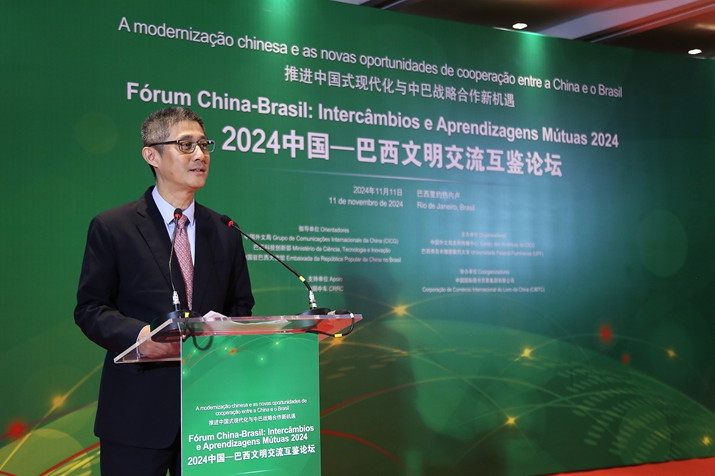
Gao delivers a speech at the forum in Rio de Janeiro on November 11. (JUAN CARLOS AGUILAR)
In his speech, Gao emphasized that Chinese modernization presents new opportunities for China and Brazil to build a community with a shared future. By deepening strategic trust and aligning their respective strategies, both nations can drive their cooperation forward and make their bilateral relationship more substantial and impactful.
He stressed that the two countries should seize this opportunity to set new goals, unlock untapped potential and further deepen their cooperation across all areas, while consolidating traditional areas of cooperation.
In the face of a rapidly changing global landscape, Gao noted that the overall direction of human progress and the broader patterns of world history remain unchanged. The trend of building a community with a shared future for humanity is also unwavering. China and Brazil should adapt to new global dynamics, work together to maintain peace, stability and development, and create a positive environment for common development.
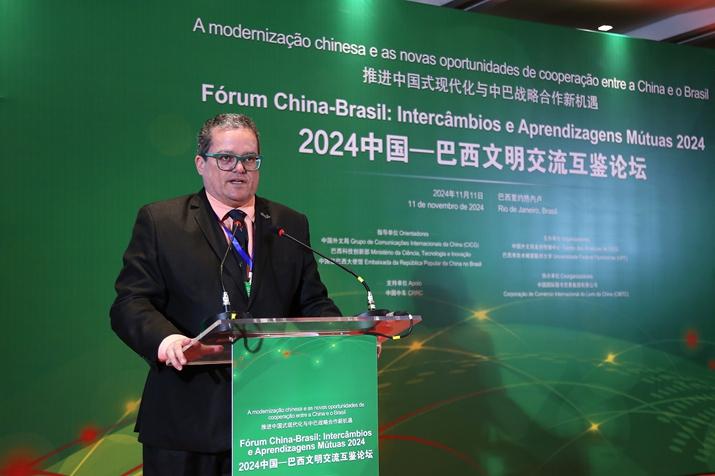
Ronaldo Carmona, an advisor at the funding authority under the Brazilian Ministry of Science, Technology and Innovation, delivers a speech at the forum in Rio de Janeiro on November 11. (JUAN CARLOS AGUILAR)
Carmona highlighted in his speech that the forum came at a special time, right before the Group of 20 (G20) Leaders' Summit in Rio de Janeiro from November 18 to 19. Against a turbulent global geopolitical backdrop, the China-Brazil partnership has intensified, creating an opportunity for dialogue between Group of Seven (G7) countries and emerging nations.
He emphasized the importance of global multi-polarity, where different power centers promote sustainable development and peace in the Global South. Carmona also pointed out the long history of Sino-Brazilian cooperation in the field of science and technology, particularly in the space sector—with the CBERS (China-Brazil Earth Resources Satellite) satellite program, which strengthens the technological autonomy of both nations.
He further noted that the China-Brazil partnership should also evolve in the cultural sphere, stressing the need for new projects celebrating each country's individuality.
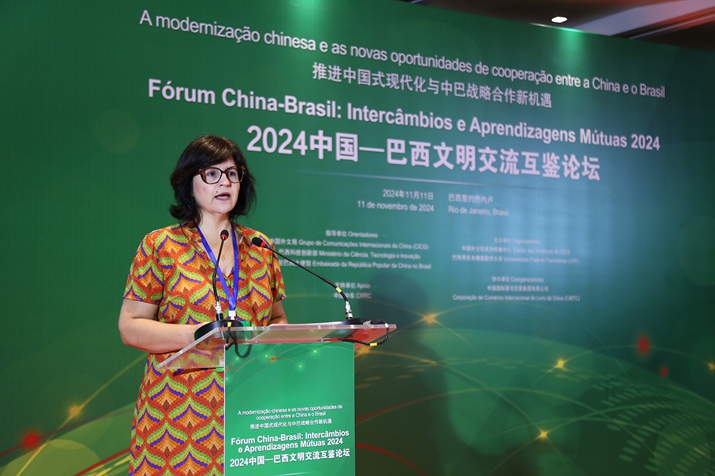
Cybele Carneiro, a law professor from Fluminense Federal University, delivers a speech at the forum in Rio de Janeiro on November 11. (JUAN CARLOS AGUILAR)
In her speech, Carneiro highlighted three priority areas for cooperation between Brazil and China: education, innovation and sustainability.
According to the professor, the two countries' bilateral partnership empowers an intercultural generation and promotes mutual understanding, valuing cultural originalities. She argued that it is through education and sustainable innovation that Brazil and China can contribute to global development, underscoring the importance of cultural interaction and mutual respect.
"Those who removed the mountain were the ones who took the first stones," said Carneiro, encouraging the creation of new, tangible plans in China-Brazil cooperation.
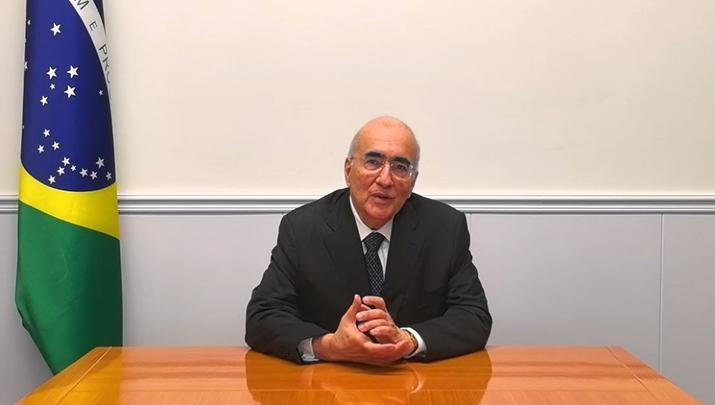
Marcos Galv?o, Brazilian Ambassador to China, delivers a speech to the forum in Rio de Janeiro via video link on November 11. (JUAN CARLOS AGUILAR)
Ambassador Galv?o shared his thoughts in a video speech. "This forum takes place at a unique moment in the Sino-Brazilian relationship. At the highest point of our bilateral relationship, we are celebrating 50 years of diplomatic relations between Brazil and China," he said.
Galv?o stated that over the past five decades, the two countries have overcome differences and strengthened similarities, building a solid partnership marked by mutual respect, constant dialogue, converging interests in cooperation across different areas, and trust.
He emphasized that it's "a trust that we are working toward the development of both countries and for the wellbeing of both our peoples; a trust that we can fight for a more just and equitable international system, representing the interests of developing countries; [and] a trust that we are and should be fighting for a more sustainable world, free from poverty."
The ambassador also mentioned that Brazil and China have always faced many challenges, including geographical distance, language barriers and cultural differences. "There is a great deal of ignorance in broad sectors of our societies about the realities of each of our countries. We need to change this status quo as soon as possible. But this is an undertaking that we know takes time, as well as a complex job that requires investment."
Galv?o said he's convinced that "we can build an even stronger, more diversified and mutually beneficial Brazil-China relationship," and believes that initiatives like this forum play a valuable role in this journey.
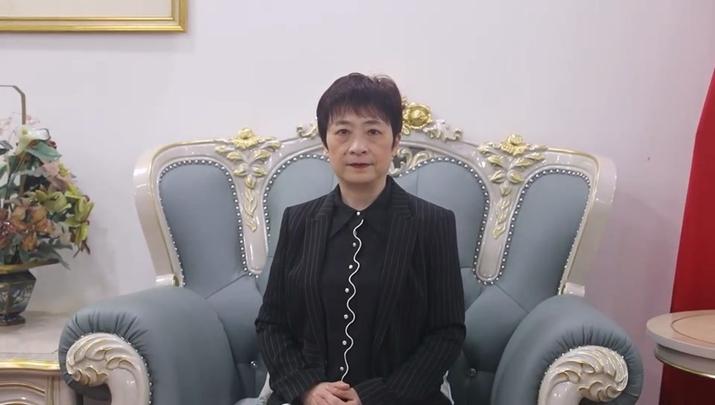
Tian Min, Chinese Consul General in Rio de Janeiro, delivers a speech to the forum in Rio de Janeiro via video link on November 11. (JUAN CARLOS AGUILAR)
Tian said that over the past 50 years, China and Brazil have consistently treated each other with respect and equality, fostering a cooperative and mutually beneficial relationship that has contributed to the sustained and deepening development of bilateral ties. The two countries have continuously expanded practical cooperation in various fields, yielding fruitful results that have benefited their peoples. Currently, China is steadfastly promoting peace, development and win-win cooperation, advancing Chinese modernization through high-quality development, and enhancing global development through high-level openness. China is willing to work with Brazil to expand mutually beneficial cooperation across a broader scope, with higher quality, and better structure, in order to support sustainable growth and create more benefits for both nations' peoples.
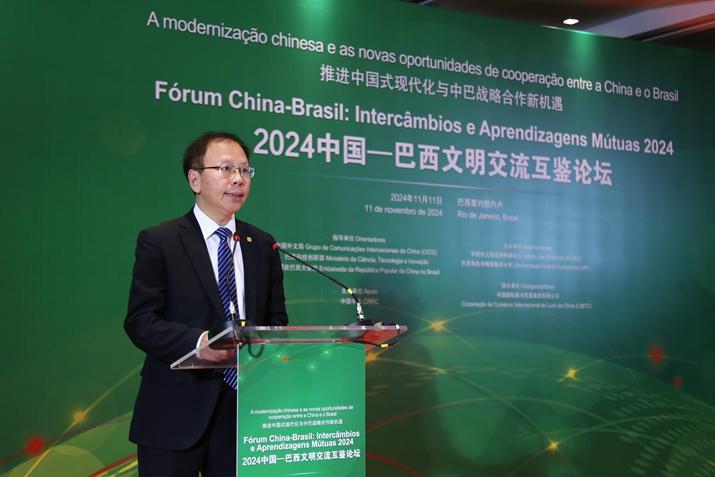
Liu Ke'an, Vice President of CRRC Corp. Ltd., delivers a speech at the forum in Rio de Janeiro on November 11. (JUAN CARLOS AGUILAR)
Liu stated that since it began serving the Brazilian market in 2003, CRRC has withstood challenges and earned respect. Through their collaboration, both sides have created value, shared results and achieved mutual success. CRRC has adhered to the Five Localization Model—local production, local sourcing, local employment, local services and local management—and has actively played four key roles as a "cultural interpreter," an "industrial accelerator," a "talent incubator" and a "good neighbor" to the community. These efforts have contributed to local economic development and the wellbeing of the people. CRRC will continue to work with all parties in both China and Brazil to strengthen cooperation across a range of fields, build bridges for people-to-people connections, and help open a new chapter in the future of China-Brazil relations.

Chai Yu, Director of the Institute of Latin American Studies at the Chinese Academy of Social Sciences, delivers a keynote speech to the forum in Rio de Janeiro via video link on November 11. (JUAN CARLOS AGUILAR)
In her keynote speech, Chai said that China-Brazil cooperation holds great significance for the modernization of countries in the Global South. Both Brazil and China share the aspiration to become more prosperous, secure and happy nations, which forms a strong foundation for their mutual development. The two countries respect each other's development paths, avoid drawing ideological lines and judge matters based on their merits, setting a valuable example to the Global South. Civilizational exchange and mutual learning are the most fundamental, profound and enduring forces driving China-Brazil cooperation. Despite their unique characteristics, both countries strive for harmony in diversity and mutual beauty.
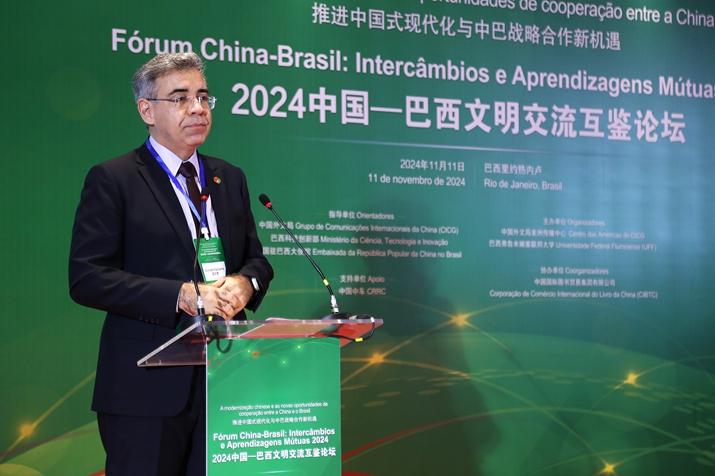
Evandro Menezes de Carvalho, Executive Editor of China Hoje, delivers a keynote speech at the forum in Rio de Janeiro on November 11. (JUAN CARLOS AGUILAR)
Carvalho pointed out that, in under 50 years—[since the country first launched its reform and opening-up policies in 1978]--and without having to invade or exploit any other country, China has made great strides. "And it counted on its people, 'cutting into its own flesh' (as we say here in Brazil), without blindly importing and applying economic formulas or models from abroad," he added. "China has proven that it is indeed possible to achieve the dream of modernization."
With rapid industrialization, he noted, China began to see heavy air pollution. However, China has [over the past decade] greatly advanced its green development. Today, the country is the largest producer of renewable energy and a global leader in electric cars, he said.
He highlighted that China's most extraordinary achievement came in 2021, when it celebrated the centenary of the founding of the Communist Party of China, namely, the eradication of extreme poverty. China had realized, 10 years ahead of schedule, the goal set by the United Nations in its 2030 Agenda for Sustainable Development.
He also pointed out that the differences between Brazil and China are complementary.
"If we tap into on the potential of this friendship, Brazil and China can truly re-draw a new path to prosperity not only for their [respective] populations, but for the countries of the Global South," he concluded.

Li Yafang, President of the CICG Center for the Americas, hosts the forum in Rio de Janeiro on November 11. (JUAN CARLOS AGUILAR)
Li hosted the forum and delivered the closing remarks. She expressed the hope that China and Brazil, based on strong political trust and mutual affection between their peoples, would deepen practical cooperation, promote mutual learning, strengthen multilateral collaboration, and elevate their comprehensive strategic partnership to new heights. She also emphasized the importance of advancing the shared vision of building a community with a shared future, ensuring that the benefits of this cooperation extend to all parties involved.

Guests participate in a panel discussion at the forum in Rio de Janeiro on November 11. (JUAN CARLOS AGUILAR)
The event also hosted a panel discussion centered on the topic "How to deepen China-Brazil strategic cooperation in the context of further comprehensive reforms and the advancement of Chinese modernization." Panelists included Li Bangyong, General Manager of CRRC Brazil, Dani Monteiro, State Deputy in the Legislative Assembly of Rio de Janeiro, Claudia Jannuzzi, Special Advisor to the Secretariat of Economic Development of the State Government of Rio de Janeiro, Júlio Cesar Azevedo, Vice President of Invest Rio, Ricardo Pique, Director of the Museum of Tomorrow in Brazil, Fabiana Ceyhan, Editor-in-Chief of Brasilia in Focus newspaper, and Renato Rovai, Editor of Forum magazine.
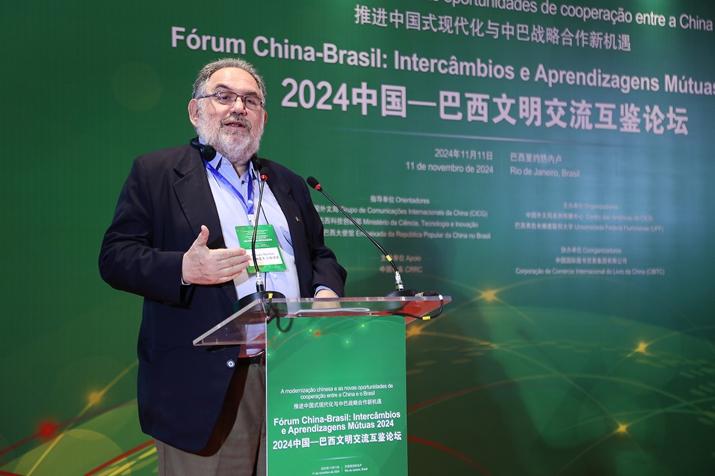
Alfredo Nastari, Deputy Editor of China Hoje, launches a special issue of the China Hoje magazine in commemoration of the 50th anniversary of China-Brazil diplomatic relations at the forum on November 11. (JUAN CARLOS AGUILAR)